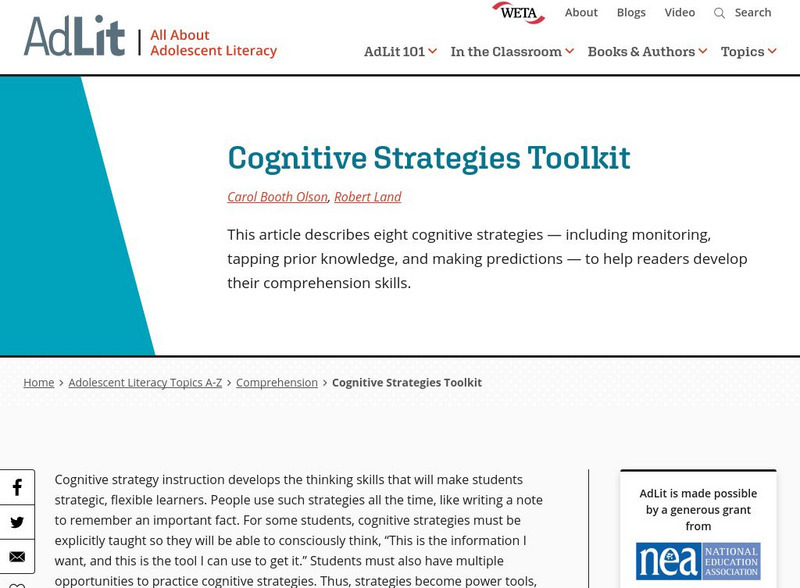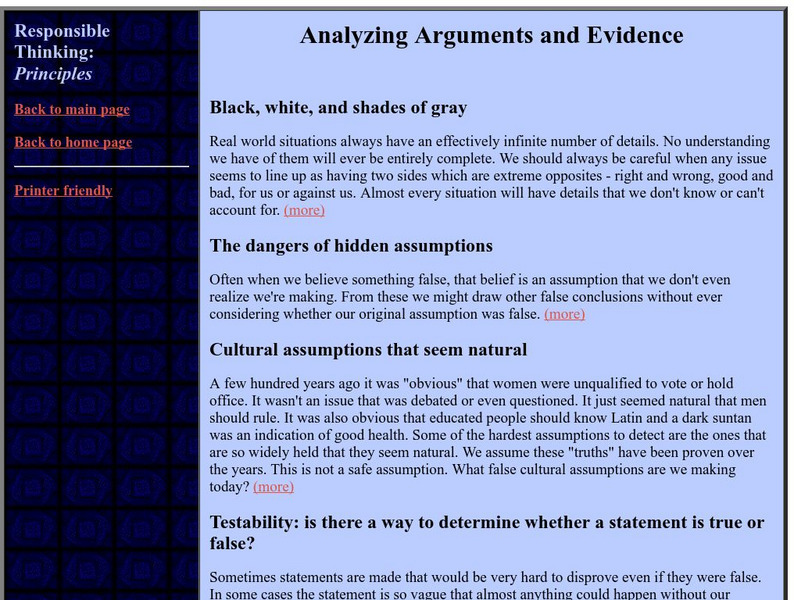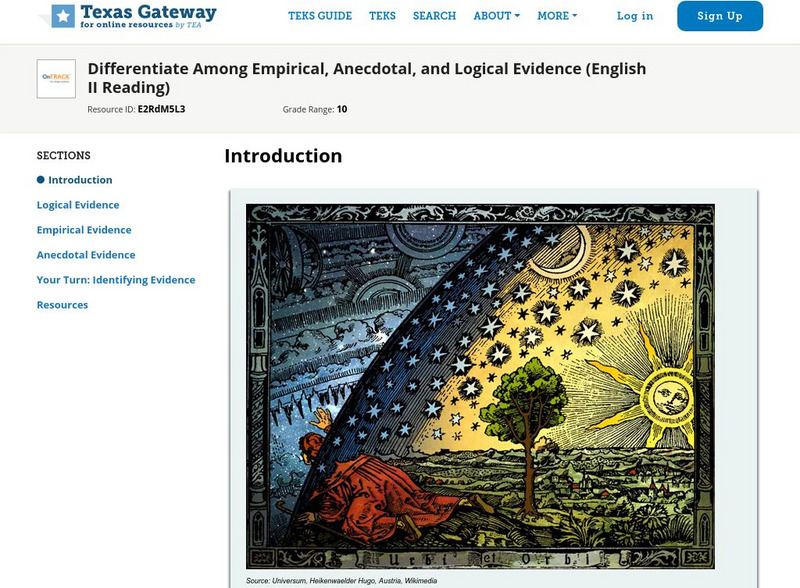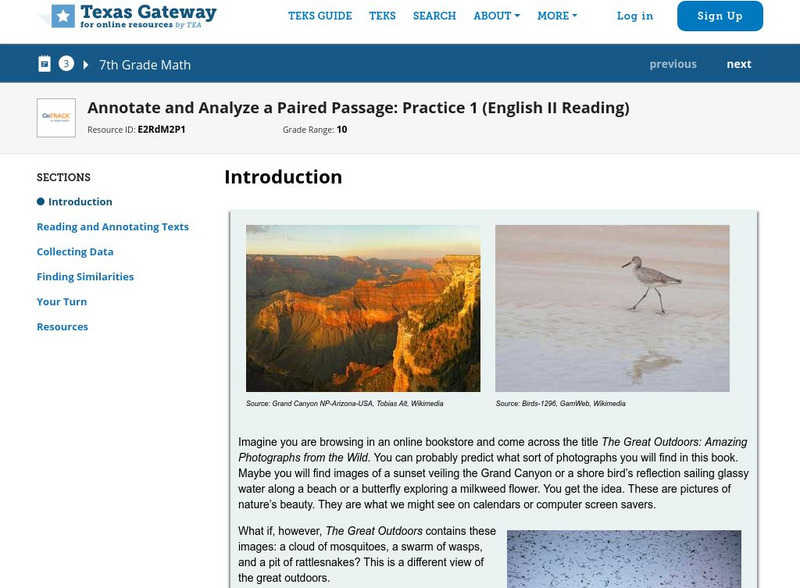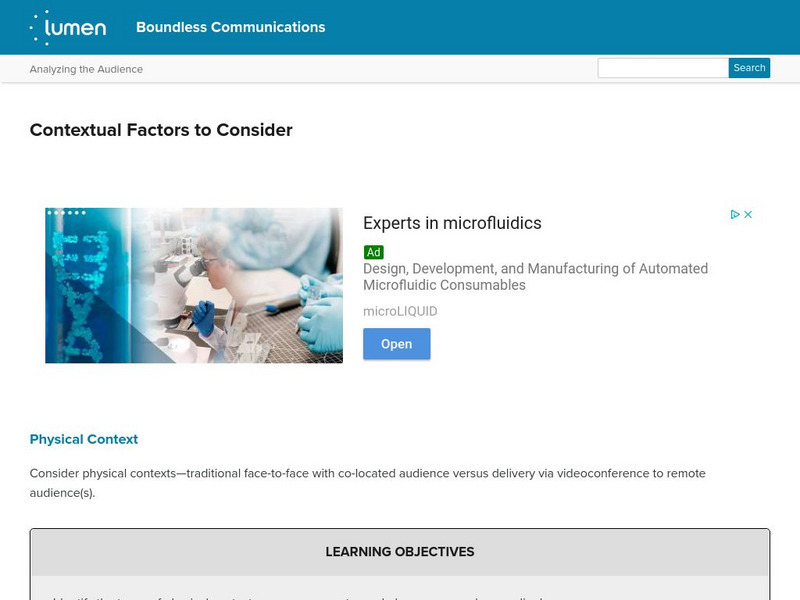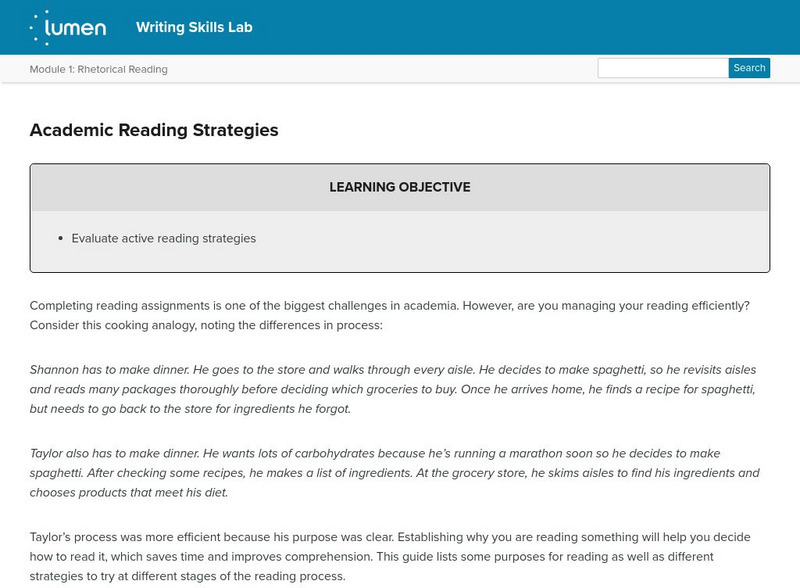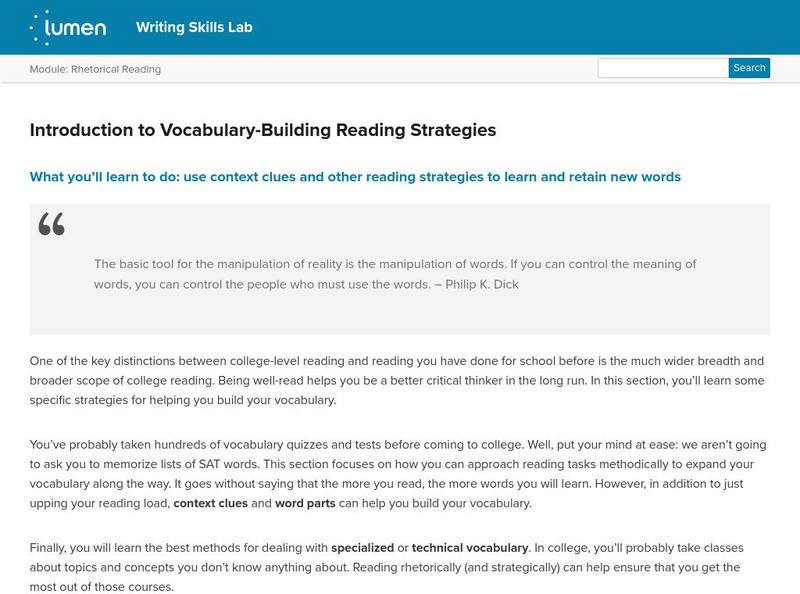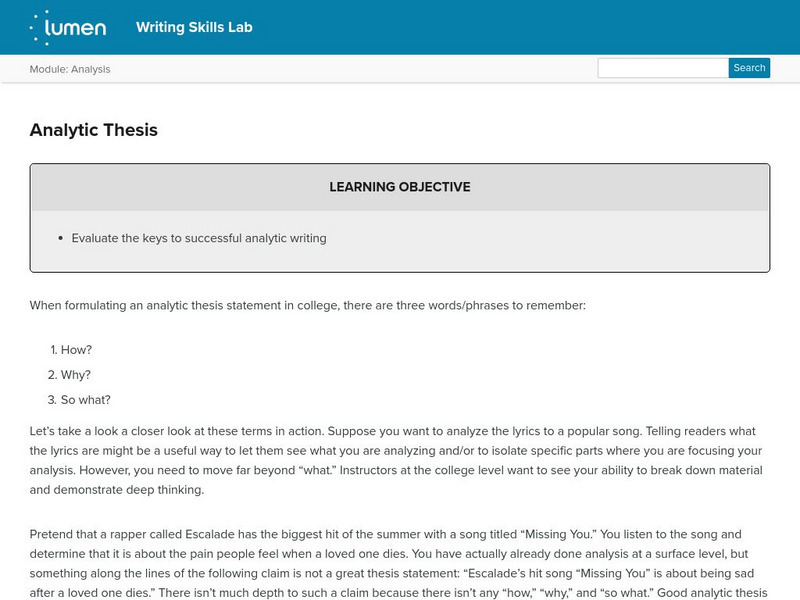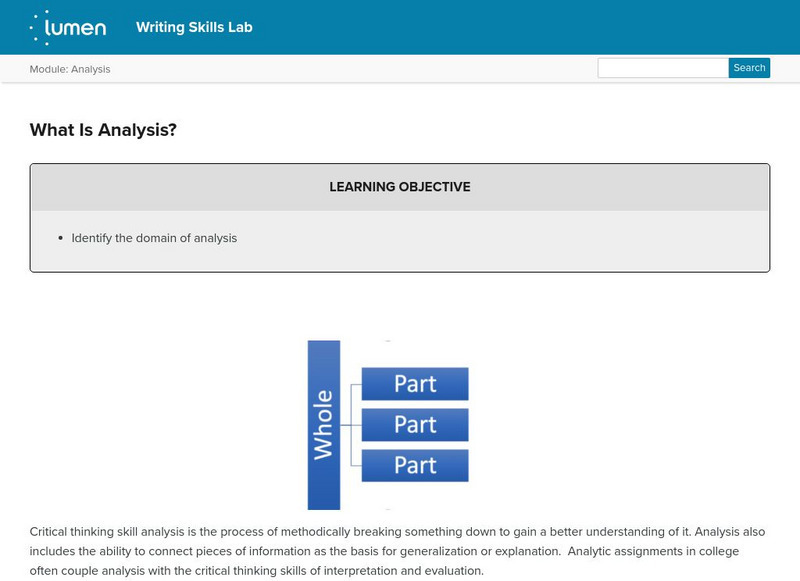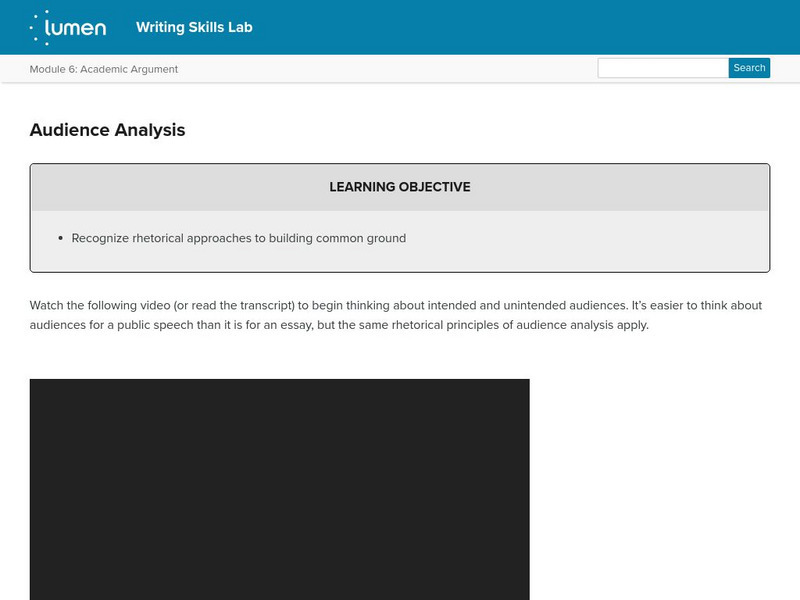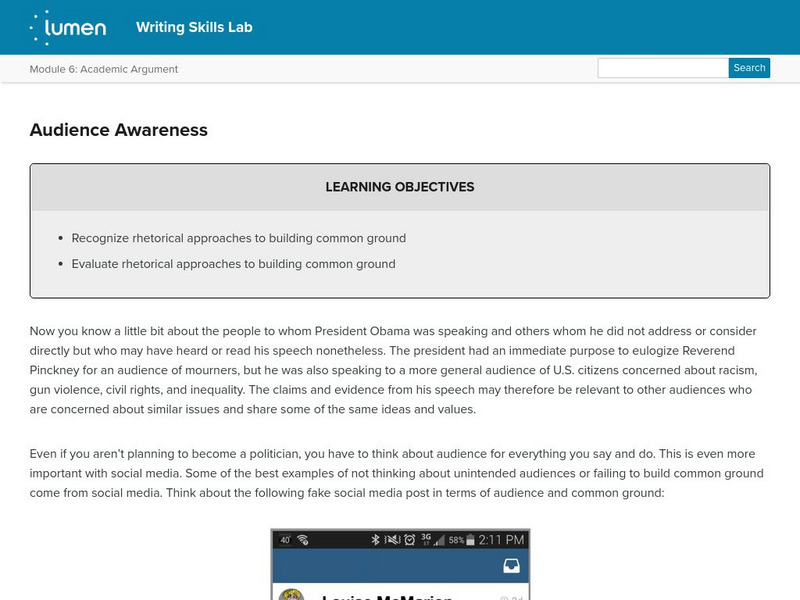AdLit
Ad lit.org: Cognitive Strategies Toolkit
This article describes eight cognitive strategies - including monitoring, tapping prior knowledge, and making predictions - to help readers develop their comprehension skills.
Other
Responsible Thinking: Analyzing Arguments and Evidence
Contains many points to consider when analyzing someone's arguments and evidence, such as the hidden assumptions, cultural assumptions, and testability. Each is explained in a short paragraph with a link to additional discussions on...
Texas Education Agency
Texas Gateway: Analyze Shifts in Perspective in Informational/persuasive Text
[Accessible by TX Educators. Free Registration/Login Required] Explain shifts in perspectives in the same argument and make decisions about support used in those arguments.
Texas Education Agency
Texas Gateway: Differentiate Among Empirical, Anecdotal, and Logical Evidence
[Accessible by TX Educators. Free Registration/Login Required] Distinguish among different kinds of evidence in a text that supports conclusions and arguments in texts.
Texas Education Agency
Texas Gateway: Analyze an Argument: Practice 1 (English Ii Reading)
Analyze the quality, relevance, and credibility of evidence that supports or opposes an argument.
Texas Education Agency
Texas Gateway: Annotate and Analyze a Paired Passage: Practice 1
Read and annotate paired texts in order to make inferences, draw conclusions, and synthesize ideas and details using textual evidence.
Lumen Learning
Lumen: Boundless Communications: Contextual Factors to Consider
This lesson focuses on contextual factors to consider when analyzing your audience including physical contexts, values, beliefs, attitudes, and needs, audience opinion of you and your topic, and audience knowledge of your topic.
Lumen Learning
Lumen: Critical Reading: Reading Strategies
This lesson plan focuses on reading strategies including scanning, skimming, SQ3R, High-5 Reading Strategies, technology, and rhetorical context. It includes text information and videos.
Lumen Learning
Lumen: Critical Reading: Conclusion to Critical Reading
This lesson focuses on the importance and purpose of reading. It features an article entitled "The Benefits of Leisure Reading."
University of Sydney (Australia)
University of Sydney: Planning the Overall Structure
This resource discusses the steps in planning the structure of a student's argumentative essay. Page 4 of this article focuses on Thesis statement.
Lumen Learning
Lumen: Rhetorical Reading: Academic Reading Strategies
This lesson focuses on reading strategies including understanding your purpose, and before, during, and after reading strategies.
Lumen Learning
Lumen: Rhetorical Reading: Intro to Vocabulary Building Reading Strategies
This article explains in general how to build vocabulary using reading strategies such as context clues.
Lumen Learning
Lumen: Rhetorical Reading: Putting It Together: Rhetorical Reading
This is a summary of the previous lessons having to do with rhetorical reading including rhetorical context, previewing text, actively reading, using context clues, and reading voraciously.
Lumen Learning
Lumen: Writing Skills: Formulaic vs. Organic Structure
This lesson focuses on the difference between formulaic writing such as the five-paragraph essay and an organic structure that puts forward an arguable statement.
Lumen Learning
Lumen: Writing Skills: Conclusions
This instructional activity focuses on strategies for writing effective conclusions. It provides a list of strategies and a sample essay.
Lumen Learning
Lumen: Analysis: Putting It Together: Analysis
This instructional activity focuses on analysis including an understanding of what analysis is, the keys to effective analysis, and the types of analytic assignments.
Lumen Learning
Lumen: Rhetorical Appeals: The Star Criteria
This lesson focuses on the STAR Criteria for evaluating appeals to logos; it includes evaluating for Sufficiency, Typicality, Accuracy, and Relevance.
Lumen Learning
Lumen: Analysis: Analytic Thesis
This lesson focuses on the forming an analytic thesis statement that includes the how, why, and so what of the subject. It also discusses the need to let the thesis develop naturally and be sure that the main claim is reasoned.
Lumen Learning
Lumen: Analysis: What Is Analysis?
This lesson focuses on analysis including defining analysis and listing the essential skills of analysis.
Lumen Learning
Lumen: Analysis: Suspend Judgment
This article focuses on the need to suspend judgment and keep an open mind while analyzing a situation or researching a topic.
Lumen Learning
Lumen: Writing Skills: Audience Analysis
This lesson focuses on audience analysis and recognizing rhetorical approaches to building common ground. A practice activity is provided.
Lumen Learning
Lumen: Writing Skills: Audience Awareness
This instructional activity focuses on audience awareness by recognizing and evaluating rhetorical approaches to building common ground. It also provides an example.
Lumen Learning
Lumen: Using Sources: Paraphrase and Summary
This lesson focuses on how to integrate source material using paraphrase and summary and the differences between the two. It also provides a practice exercise.
Lumen Learning
Lumen: Critical Reading: Logic and Structure
This lesson focuses on structure and logic including types and purposes of essays, organizational patterns, argumentative writing, and logic and fallacies.


